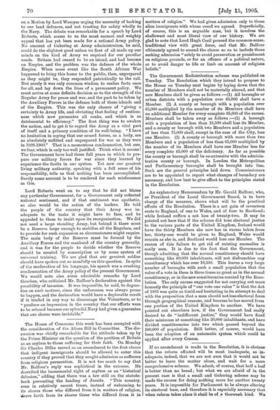The House of Commons this week has been occupied with
the consideration of the Aliens Bill in Committee. The dis- cussion was chiefly remarkable for the attitude taken up by the Prime Minister on the question of the position of Britain as an asylum to those suffering for their faith. On Monday Sir Charles Dilke moved as an amendment to the first clause that indigent immigrants should be allowed to enter this country if they proved that they sought admission as sufferers from religious persecution. It is not too much to say that Mr. Balfour's reply was sophistical in the extreme. He described the immemorial right of asylum as an "historical delusion," adding that there was a law still on the statute- book preventing the landing of Jesuits. "This country,' even in relatively recent times, instead of welcoming to its shores those who differed from it in matters of religion, drove forth from its shores those who differed from it in matters of religion." We had given admission only to those alien immigrants .with whose creed we agreed. Superficially, of course, this is an arguable case, but it involves the shallowest and most literal view of our history. We are glad to note that Lord Hugh Cecil pressed the common-sense, traditional view with great force, and that Mr. Balfour ultimately agreed to amend the clause so as to include those seeking admission " solely to avoid persecution or punishment on religious grounds, or for an offence of a political nature, or to avoid danger to life or limb on account of religious beliefs."






































 Previous page
Previous page